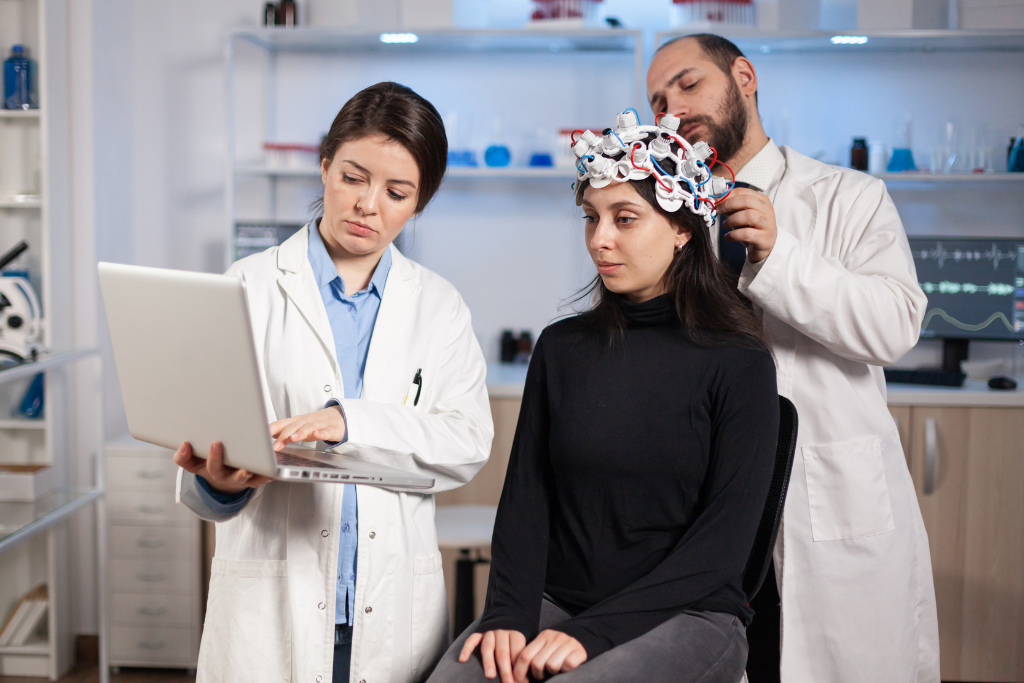Hormones can mess with women’s brain health, messing with everything from memory to emotions. When women go through big life changes like pregnancy, menopause, and getting older, these hormonal changes can impact how their brains work and even affect long-term risks for stuff like Alzheimer’s.
At Poplar Ave Clinic – Women’s Health Clinic In Memphis, we’re all about taking a full-on approach to women’s health, helping our patients deal with these changes, and making sure they’re feeling their best.
Understanding how hormones mess with cognitive health, women can make smart choices to keep their brains safe and improve their overall quality of life.
In this article, we’ll dive into how hormones mess with the brain at each stage and give some real-life tips to keep your brain healthy all through life.
The Role Of Hormones In Women’s Brain Health
Hormones act as essential messengers that regulate numerous processes in the body, including those that impact the brain.

In women, hormones like estrogen, progesterone, and oxytocin not only influence reproductive health but also play significant roles in cognitive function, mood, and mental clarity.
Whether it’s the hormonal surges during pregnancy, changes during menopause, or the effects of aging, these hormones uniquely affect brain structure and function.
Understanding the roles of these hormones can empower women to better manage cognitive changes, cope with symptoms, and take proactive steps to support long-term brain health.
The Role Of Hormones In Women’s Brain Health During Pregnancy
When you’re pregnant, your body goes through big changes, including a rise in hormone levels like estrogen and progesterone. These hormones impact your brain health and thinking.
How Estrogen Affects Your Brain?
Estrogen levels go up during pregnancy, which can make your brain work better. It helps with the baby’s growth and can improve your memory, learning, and verbal skills. Many women also notice that they become better at understanding and dealing with their emotions during pregnancy.
The Calming Effect Of Progesterone
Another hormone that increases during pregnancy is progesterone. It has a calming effect on the brain, helping to manage mood and reduce anxiety. This hormone also plays a role in bonding with the baby.
The Importance Of Oxytocin
Oxytocin, also known as the “love hormone,” is released during activities like skin-to-skin contact and breastfeeding.

It helps create emotional connections between you and your baby, promoting feelings of love and attachment. This can boost your mental well-being and focus.
Dealing With “Pregnancy Brain”
While hormonal changes can improve some thinking abilities, many women experience what’s known as “pregnancy brain,” with forgetfulness and reduced focus. This is because your brain is focusing on getting emotionally ready to bond with your baby. It’s normal and understanding this can help you cope with these changes.
Hormones In Women’s Brain Health During Menopause
Estrogen’s Role In Protecting The Brain
Estrogen is important for keeping your brain healthy. During menopause, as estrogen levels decrease, many women experience changes in memory and concentration, often called “brain fog.” Estrogen helps keep brain cells healthy and helps them communicate, so when it decreases, it can lead to cognitive challenges.
Mood Changes And Emotional Well-Being
The drop in hormones can also affect your mood. Many women report feeling more anxious, irritable, or sad during menopause. Understanding that these emotional changes are related to hormonal shifts can help you feel more in control and seek the right support.
Memory And Focus
As estrogen levels drop, you may find it harder to focus or remember things. Regular mental exercises, like reading or puzzles, and staying socially active can help keep your brain sharp during this time.
The Role Of Hormones In Humans During Alzheimer’s Disease
Alzheimer’s disease is a tough one, affecting millions of people worldwide and causing memory loss, cognitive decline, and a loss of independence.

It’s a progressive disorder, and while we’re still figuring out the exact causes, research suggests that hormones, especially in women, play a big role in how the disease develops and progresses.
Estrogen And Brain Health
Estrogen is known for protecting our brains. When women go through menopause and experience a big drop in estrogen, they might have a higher risk of developing Alzheimer’s. Estrogen helps keep our brains in good shape, supports connections between brain cells, and fights inflammation. So, when estrogen levels drop, it could contribute to the cognitive issues seen in Alzheimer’s patients.
Progesterone And Brain Protection
Just like estrogen, progesterone also helps keep our brains healthy and fights inflammation. Low levels of progesterone might make cognitive decline worse in people with Alzheimer’s. Understanding how these hormones work together can help us understand why women might have a different risk and experience with Alzheimer’s.
Insulin And Blood Sugar
Insulin, the hormone that helps control our blood sugar, is also tied to Alzheimer’s. When our bodies become resistant to insulin, which often happens in type 2 diabetes, it might raise the risk of Alzheimer’s. Our brains need insulin for memory and learning, so problems with insulin can mess with our cognitive function and lead to the buildup of amyloid plaques, a key feature of Alzheimer’s.
Oxytocin And Emotions
Oxytocin, also known as the “love hormone,” has been studied for its effects on social bonding and emotional well-being. Some research suggests that it might help improve memory and cognitive function, especially for those with Alzheimer’s. Being socially active and getting emotional support could boost oxytocin levels, which might be good for cognitive health.
Treatment Options For Hormone-Related Brain Health Issues At Poplar Ave Clinic
Hormone Replacement Therapy (HRT)
When it comes to managing symptoms from hormonal ups and downs, especially during menopause, Hormone Replacement Therapy is a big deal.

It can help get estrogen and progesterone levels back on track, easing things like memory loss, mood swings, and cognitive decline.
Meds For Brain Fog
For folks dealing with brain fog and other cognitive symptoms linked to hormonal changes, we might suggest meds like cholinesterase inhibitors.
The Power Of Nutritional Boosters
We know that nutritional supplements can be a real game changer for brain health. We might suggest stuff like omega-3 fatty acids, vitamin D, and B vitamins to keep your cognitive function and hormonal balance in top form.
Brain Workouts And Therapy
Getting into some brain training exercises can be a smart move for boosting memory and cognitive function. Our clinic has your back with programs and resources that give your brain a workout with puzzles, games, and new skills.
Regular Check-Ups For The Win
Keeping an eye on those hormone levels and brain health is a big deal. At our Women’s Health Clinic in Memphis, we’re all about giving you the full scoop with thorough check-ups that look at your hormone status and cognitive function.
Final Thoughts
At Poplar Avenue Women’s Health Clinic in Memphis, we’re here to support women’s health every step of the way. We understand how hormonal changes can impact your well-being, and we’re committed to providing personalized care to help you thrive. Whether you’re dealing with menstruation, pregnancy, menopause, or beyond, we are here to help!

